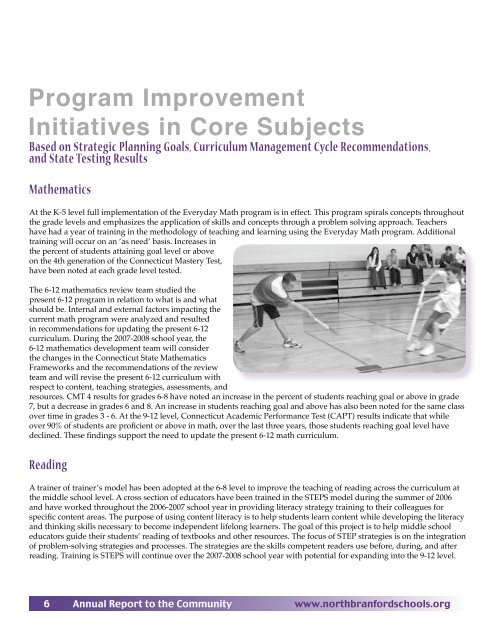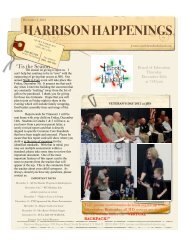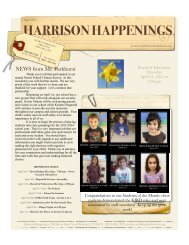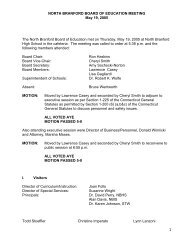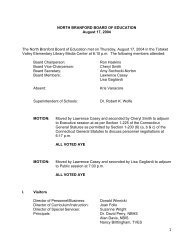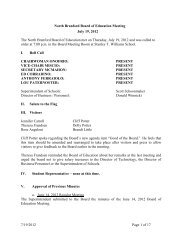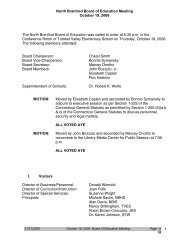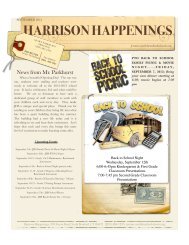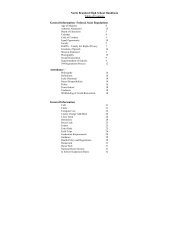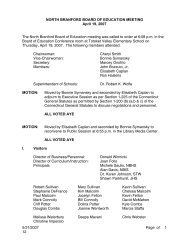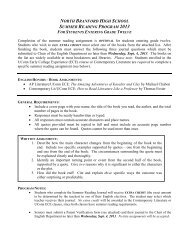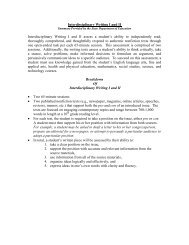Annual Report of the Superintendent - North Branford Public Schools
Annual Report of the Superintendent - North Branford Public Schools
Annual Report of the Superintendent - North Branford Public Schools
Create successful ePaper yourself
Turn your PDF publications into a flip-book with our unique Google optimized e-Paper software.
Program Improvement<br />
Initiatives in Core Subjects<br />
Based on Strategic Planning Goals, Curriculum Management Cycle Recommendations,<br />
and State Testing Results<br />
Ma<strong>the</strong>matics<br />
At <strong>the</strong> K-5 level full implementation <strong>of</strong> <strong>the</strong> Everyday Math program is in effect. This program spirals concepts throughout<br />
<strong>the</strong> grade levels and emphasizes <strong>the</strong> application <strong>of</strong> skills and concepts through a problem solving approach. Teachers<br />
have had a year <strong>of</strong> training in <strong>the</strong> methodology <strong>of</strong> teaching and learning using <strong>the</strong> Everyday Math program. Additional<br />
training will occur on an ‘as need’ basis. Increases in<br />
<strong>the</strong> percent <strong>of</strong> students attaining goal level or above<br />
on <strong>the</strong> 4th generation <strong>of</strong> <strong>the</strong> Connecticut Mastery Test,<br />
have been noted at each grade level tested.<br />
The 6-12 ma<strong>the</strong>matics review team studied <strong>the</strong><br />
present 6-12 program in relation to what is and what<br />
should be. Internal and external factors impacting <strong>the</strong><br />
current math program were analyzed and resulted<br />
in recommendations for updating <strong>the</strong> present 6-12<br />
curriculum. During <strong>the</strong> 2007-2008 school year, <strong>the</strong><br />
6-12 ma<strong>the</strong>matics development team will consider<br />
<strong>the</strong> changes in <strong>the</strong> Connecticut State Ma<strong>the</strong>matics<br />
Frameworks and <strong>the</strong> recommendations <strong>of</strong> <strong>the</strong> review<br />
team and will revise <strong>the</strong> present 6-12 curriculum with<br />
respect to content, teaching strategies, assessments, and<br />
resources. CMT 4 results for grades 6-8 have noted an increase in <strong>the</strong> percent <strong>of</strong> students reaching goal or above in grade<br />
7, but a decrease in grades 6 and 8. An increase in students reaching goal and above has also been noted for <strong>the</strong> same class<br />
over time in grades 3 - 6. At <strong>the</strong> 9-12 level, Connecticut Academic Performance Test (CAPT) results indicate that while<br />
over 90% <strong>of</strong> students are pr<strong>of</strong>icient or above in math, over <strong>the</strong> last three years, those students reaching goal level have<br />
declined. These findings support <strong>the</strong> need to update <strong>the</strong> present 6-12 math curriculum.<br />
Reading<br />
A trainer <strong>of</strong> trainer’s model has been adopted at <strong>the</strong> 6-8 level to improve <strong>the</strong> teaching <strong>of</strong> reading across <strong>the</strong> curriculum at<br />
<strong>the</strong> middle school level. A cross section <strong>of</strong> educators have been trained in <strong>the</strong> STEPS model during <strong>the</strong> summer <strong>of</strong> 2006<br />
and have worked throughout <strong>the</strong> 2006-2007 school year in providing literacy strategy training to <strong>the</strong>ir colleagues for<br />
specific content areas. The purpose <strong>of</strong> using content literacy is to help students learn content while developing <strong>the</strong> literacy<br />
and thinking skills necessary to become independent lifelong learners. The goal <strong>of</strong> this project is to help middle school<br />
educators guide <strong>the</strong>ir students’ reading <strong>of</strong> textbooks and o<strong>the</strong>r resources. The focus <strong>of</strong> STEP strategies is on <strong>the</strong> integration<br />
<strong>of</strong> problem-solving strategies and processes. The strategies are <strong>the</strong> skills competent readers use before, during, and after<br />
reading. Training is STEPS will continue over <strong>the</strong> 2007-2008 school year with potential for expanding into <strong>the</strong> 9-12 level.<br />
6 <strong>Annual</strong> <strong>Report</strong> to <strong>the</strong> Community www.northbranfordschools.org


